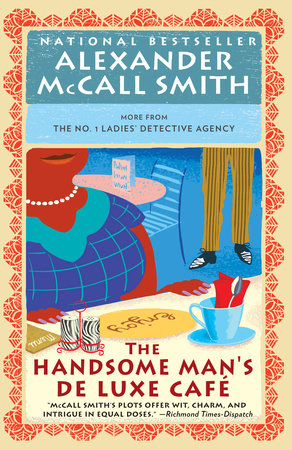The Handsome Man’s De Luxe Café Reader’s Guide
By Alexander McCall Smith


1. One theme in this volume of the No. 1 Ladies’ Detective Agency series is the importance of small acts of kindness—from Mma Ramotswe’s visiting Charlie in his home and hiring him on the spot, to Clovis Andersen’s advice that “the person to whom you are talking will always be readier to help if you are polite and friendly” (p. 48). How does this theme tie into the novel and the series as a whole?
2. What do you think of Phuti Radiphuti’s reasoning for arriving at his office late in the mornings? “By arriving late, he felt, the assistant managers would have an hour or so during which they could manage”. Is this a good business practice?
3. Mr. J.L.B. Matekoni explains, “People don’t realise it, but it is never easy being a boss, no matter how well things are going”. Do you agree with this based on your experience of being either an employer or an employee? Why or why not? Discuss the ways in which it is both easy and difficult to be a boss or manager of others. Compare Mr. J.L.B. Matekoni to Phuti Radiphuti as a boss.
4. The Handsome Man’s De Luxe Café contains advice about dealing with husbands and men in general. What does Mma Ramotswe suggest Mma Makutsi find out about her husband, and what does she encourage Mma Makutsi to do? What do these two women think are the biggest differences between the sexes?
5. “There was no real reason to be in a hurry, when one came to think about it; important people, she had noticed, did not walk fast, but seemed to amble, and if they were not in a hurry when they had all those things to do and to worry about, then why should the rest of us imagine that we needed to be in any sort of rush?”. Comment on and discuss this passage. Do you agree that the world is getting too harried and we are rushing through life? How do Mma Ramotswe’s comments fit in with the current slow movements in food, parenting, and living?
6. Mma Potokwane admits to Mma Ramotswe, “Every decision I’ve made in this job—every single one—has been made with the heart rather than with the head”. Discuss with the group an important decision you made recently in which you followed your heart rather than your head.
7. When Mma Ramotswe is apprehensive about what to do in a difficult situation, she thinks about what her father would do and say. She remembers his advice about life in short proverbs. Discuss this one: “When you don’t talk about something, then something will talk about itself for you”. Can you think of an example when this proved true in your life?
8. Does Mma Ramotswe ultimately help Lakshmi? How? Do you approve of her advice to Lakshmi? When do you think it is okay to bend the rules a little? Or is it never all right?
9. When Mma Ramotswe sees a woman encouraging her children to eat as much fruit as they can in the supermarket, she wants to report her. “When other people behaved dishonestly it was the business of others, because if we did not react to the bad behaviour of others, then we weakened the whole of society, and that was definitely part of everybody’s business”. What happens once she reports the woman and her children? What do you think of the outcome?
10. Upon forgiving Charlie, Mma Ramotswe thinks to herself, “What was the point of anger? There were occasions when Mma Ramotswe, like all of us, could feel angry, but they were few—and they never lasted long”. How do you think she’s able to not stay angry at Charlie, and why does she forgive him and give him another chance? Would you have done the same? Should you have done the same? Would you agree that compassion is a theme in all the No. 1 Ladies’ Detective Agency novels?
11. How is this book both similar to and different from previous volumes in the No. 1 Ladies’ Detective Agency series?
12. How is place, the setting of Botswana, important in these novels? Could these stories take places anywhere else in the world? How and how not?
13. What do you think of the ending of this book? Do you think the Ladies’ Afternoon Café will be successful? What sorts of tea and cake do you recommend that they serve?
Just for joining you’ll get personalized recommendations on your dashboard daily and features only for members.
Find Out More Join Now Sign In